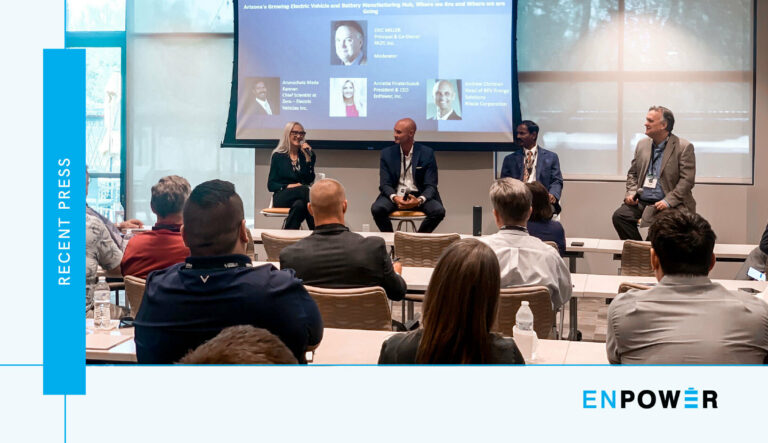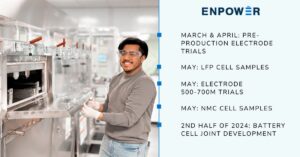EnPower, Inc. is celebrating National Battery Day by showcasing the company's significant upcoming milestones, underscoring another year of successful growth and development as a US owned and operated battery cell manufacturer.
Building Better Batteries
Arizona’s Growing Electric Vehicle and Battery Manufacturing Hub: Where We Are and Where We Are Going
July 15, 2021

The Arizona Aerospace, Aviation, Defense, & Manufacturing Conference on July 15, 2021 marked the first live event for many companies in the Arizona technology ecosystem since pre-COVID-19. The conference provided a forum for networking (handshakes included!) and included a lineup of speakers spanning the state’s traditional manufacturing sectors, emerging markets, and entrepreneurial ventures.
Electric Valley was the primary topic of interest at this year’s conference. The term recently made headlines in Phoenix, describing Arizona’s attraction of companies from all aspects of the electric vehicle industry. OEMs building in the valley include ElectraMeccanica, Nikola Motor Company, and Lucid Motors, among others. In addition, Li-Cycle, a battery recycling company, announced a new facility in Gilbert, AZ. Battery technology is the platform that underpins this growth, and EnPower is positioned to play a key role in the EV supply chain in Arizona and the Southwest.
EnPower was thrilled to participate in a panel conversation hosted by Eric Miller, owner of PADT and Chairman of the Arizona Technology Council. Panelists represented three distinct aspects of the electric vehicle value chain – battery cells, battery packs, and vehicles.
- Panelists:
- Annette Finsterbusch, President & CEO of EnPower, Inc.
- Dr. Arunachala Kannan, Chief Scientist, Zero Electric Vehicles
- Andrew Christian, Head of BEV Energy Solutions, Nikola Motor Company
It was clear from each participant that these companies have found Arizona to be an advantageous business community. Highlights include the low cost of operating, the ecosystem of technology companies, and the robust talent pipeline. Dr. Kannan doubles as a professor at Arizona State University and said that ZEV has had tremendous success in hiring local talent, including setting up a capstone project that develops a pipeline of students with specific skills for battery pack design and analysis.
In addition to electric vehicles, though, one question from the audience asked about the future of electric aviation. Prescott, AZ is home to emerging companies eViation and CP Technologies, and the state may become a testbed for automated flight much as it has been for autonomous vehicles. This is one example of many subsegments of transportation that have the potential to be electrified. Panelists agreed that each application requires specific development, but that the learnings from automotive are opening doors for these new electric mobility applications. For a battery startup like EnPower, Ms. Finsterbusch says these segments are an important part of the equation. “For our scale, companies working on emerging applications are great because it allows us to grow together.”
To meet the needs of so many different markets, Mr. Christian does not think there is a one-size-fits-all solution. At Nikola, fuel cells and batteries both have a place in the future of heavy-duty trucking. “All technologies can coexist in the ecosystem,” he says.
One common theme throughout the conversation was that the problems facing the electrification of transportation are too big for any one company to tackle. Key challenges include battery technology, infrastructure, supply chain security, and consumer education. “These are problems that have to be solved together,” said Ms. Finsterbusch. “When LED technology was emerging, government regulations were not enough to reach the tipping point. Manufacturing companies ultimately had to work together on system-level solutions to move the needle.” The importance of collaboration and consortiums is seen across other industries as well, and may be on the horizon for Arizona’s EV ecosystem.
Will Arizona succeed in building the Electric Valley? According to Ms. Finsterbusch, “The market is ours to lose.”
“These are problems that have to be solved together.”
– ANNETTE FINSTERBUSCH, PRESIDENT & CEO
The Underserved Battery Markets
Batteries aren’t just for EVs. There is a world of opportunity; many will prove vital to the green world economy that lies ahead.
Arizona Business Leaders Call for Federal Investments in Clean Energy and Jobs to Grow Arizona’s Economy
Arizona business leaders come together for a live video press conference to speak on their support of the Build Back Better Act
Footer
ABOUT US
HEADQUARTERS


